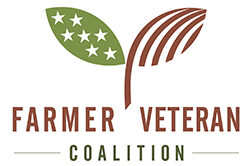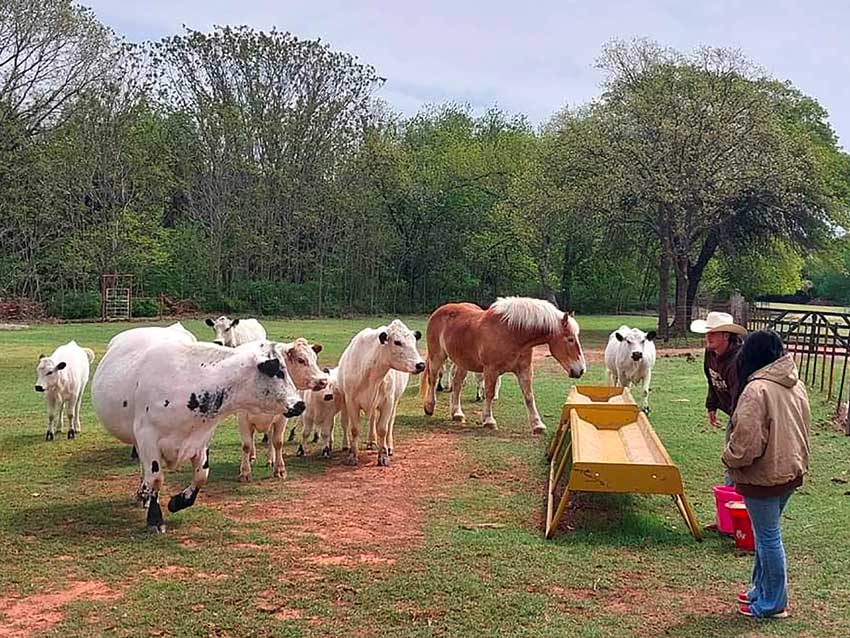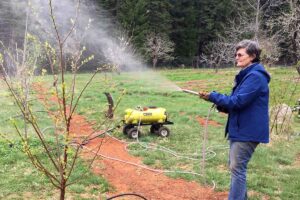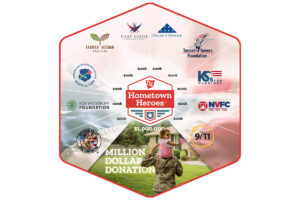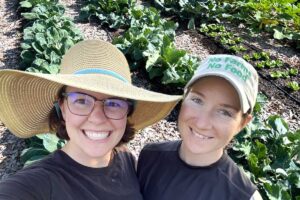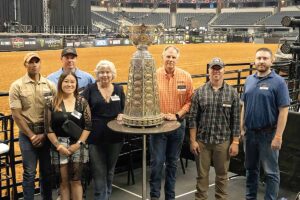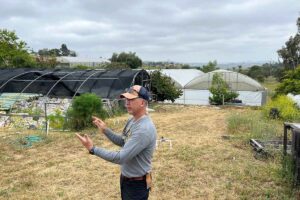Farming can be daunting, but the response from their customers makes it worthwhile for Sean and Faye Autry of Thunder Valley Ranch in Oklahoma.
“There have been many times we were ready to sell it all,” Faye Autry said. “But in the end, it’s worth hearing from our customers how much they love our beef and we are the only beef they will eat.
“They literally call me at 10 p.m. to come get beef because they ran out for their Father’s Day cookout! Or our customers that tell us they depend on the local hay we cut for their own animals.
“But mostly I love seeing our youth get involved, seeing them build their own agricultural business and cattle herd. Knowing we are passing on our knowledge and legacy to them makes it all worth it in the end!”
Sean and Faye are both military veterans. Sean grew up in Norman, Oklahoma, out by Lake Thunderbird. He worked on his uncle’s ranch and on the farms of family friends while growing up. He has Native American ancestry; his paternal grandmother was Cherokee.
He joined the Army National Guard in 1996 as a 63 Bravo then went to 63 Sierra. Sean was activated February 2003 to March 2004 in Operation Enduring Freedom and Operation Iraq Freedom and was honorably discharged due to several medical issues. He is now a 100% disabled veteran.
Faye grew up near Pittsburgh, Pennsylvania. Her only experience with farming was as a kid working and riding horses from the racetrack and hacking (riding noncompetitive horses).
After graduating Saint Vincent College in 2003 with a bachelor’s degree, she joined the Air Force in 2006. She graduated from AWACS flight school in 2008 and earned her first master’s degree in 2010.
An accident in 2011 injured her severely with a broken pelvis and ruptured bladder; she was honorably discharged in 2012. She also is now a 100% disabled military veteran.
“I then became a special education teacher through the Troops to Teachers program and taught for four years,” she said. “I completed my second master’s in special education in 2016 and then my Ph.D. in 2020. I also became a licensed Board-Certified Behavioral Analysis-Doctoral (BCBA-D) in 2020 as well.
“I now work full time as a contracted telehealth BCBA-D in an ABA clinic and then teach as an adjunct professor at the East Central University and Texas A&M International University.”
When the Autrys bought the ranch, it already had the Thunder Valley name.
“On a quiet night you can hear the race cars from the Thunder Valley Raceway about seven miles southwest of the ranch,” Faye said.
First FSA Loan
They got their first FSA loan in 2014 and bought six heifer commercial cattle, three with calves bred.
“The day we brought them home all six cows jumped every fence we had, and we lost all of them as an ice storm hit,” Faye said. “All we had left were three orphaned calves (two heifers, one bull). We bottle-fed them and then hired wranglers out of the OKC stockyards to come down with their dogs and catch the five wild cows we found two miles away.
“We sent them packing, lost two-thirds of our money, and never found the sixth cow. To this day everyone talks about a wild herd of cows that runs around out here and she probably ended up with them.”
The Autrys expanded their business with an operational FSA loan to buy hay equipment in 2018 and then a hay field and another herd of cows in 2020.
“As of right now we have roughly 80 head of cattle with four bulls between the two herds/farms on around 200 acres,” Faye said. “We do rotational grazing. In fact, we just planted winter wheat and will soon move the herds to their winter grazing. Sean and our farmhand/nephew bale around 300 to 400 acres of hay through several leases we have in the local area.”
In running the ranch, Faye handles the accounting and taxes as well as doing some basic farm labor like feeding and restocking the feed.
Sean gets the bulk of the hard farm labor, whether it’s baling hay, building fence, planting wheat or oats, as well as moving the cows and taking them to the veterinarian.
Their nephew, Jaxson, lives next door and works as their hired hand to help Sean in the daily running of the farm and hay operation. Jaxson’s brother Tatum helps occasionally with the cattle.
“We are very proud to support our nephew,” Faye said. “He is not even 18 years old and already has his own small tractor/lawn mowing business on the side and just bought himself his own square baler to become a partner in our hay operation.
“He also has four cows of his own within our herd that he has literally built from scratch and hopes to one day either take over our operation or branch out on his own.
“We very passionately feel it is so important that we support our younger generation farmers as less and less are getting into agriculture.”
Hay and Cattle
They sell hay (round and square bales) and raise British Whites and commercial Angus.
“We sell some weaned calves and cattle if they do not fit into our beef operation,” Faye said. “The bulk of our cattle sales is through our beef sales. We do between 15 to 22 steers a year and sell stated-inspected beef that we get processed with our beef labels and sell directly from our farm and a freezer we own in a local gourmet grocery store called Above Board Gourmet Food Shoppe (one of the owners is also military veteran).
“We also sell some of our beef through the custom-exempt process from a different local butcher; this is where we sell it by the whole and half and the customer gets to fill out the butcher sheet themselves.”
Their products are bolstered by the Homegrown By Heroes label, she added.
“The label provides visibility/image as a disabled military business that our customers like to support,” she said.
Faye said they began raising British Whites in 2018.
“I bought two heifers for my birthday and showed my first heifer and took overall reserve,” she said. “I just loved their gentle nature and how easy they are to keep fat!
“We joke how the British Whites are the gentleman’s breed. My husband and I can work the herd alone with minimal equipment, just a head gate and no extra help. With the commercial Angus herd, our fences have to be over 6 feet — piped fence — and we have to have a squeeze chute and at least six extra bodies to work the herd.
“The British White are also known as the poor man’s Wagyu for the marbling abilities due to they are such easier keepers and gentle natures. We are currently working on cross-breeding the British Whites with our commercial herd to improve our beef quality.”
Ranching Challenges
The cost of running the ranch remains the toughest challenge, they said.
“Even with selling beef, hay and cattle, the farm does not make enough to pay the FSA loans (they have five), maintenance and living costs,” Faye said. “Fortunately, we are both 100% disabled veterans and have our pensions with health care to live on, and I work three jobs from home to support the ranch expenses. Otherwise, we would have had to fold a long time ago. Unless you are a huge corporate farm there is no money in it.”
Sean said for him, time management and dealing with people tend to be the biggest obstacles. He laments “the cost of everything, and the landgrabbers buying land and cutting it up at prices not feasible for farms and ranchers to buy and make a living off the land.”
Having FSA loans comes with limitations, they noted.
“Our only word of caution with the FSA loans is it became a barrier when we wanted to build a house because FSA does 150% collateral,” Faye explained. “So literally my house property and anything else like my horse trailer and boat have a second lien on it from the FSA. This caused issues with the bank’s underwriters to loan us money to build a house, and in fact we lost three loans.
“Eventually, we were forced to buy a manufactured house in name only and customize it to a modular using a chattel loan. Luckily, I make enough money from my other three jobs to get the chattel loan, or we would never have gotten out of the old house that was falling down around us.
“If we had other ways of building up the farm business, we would have done it a different way; unfortunately, neither of us come from money, so this was our only option.”
Joyful Experiences
In addition to their customers, the ranch life has its joys, both said.
“I enjoy being out in the tractor to let my mind clear and the noise of life’s day fade into the background,” Sean said. “I also really enjoy teaching the younger generation (my nephew) about farming and ranching.”
Faye feels likewise.
“I love working with the cows and seeing what years of hard work and patience produce,” she said. “Like this year was a delight to see our new British White-Angus cross bull produced; he was several years in the making with crossing my best Angus bull out of Express Ranch bloodlines and our best British White cow.
“It was well worth the wait and we are delighted with the results!”
For more about the Autrys and Thunder Valley Ranch, go to https://www.thundervalleyranchay.com/ or their Facebook page at https://www.facebook.com/TVRhay.
